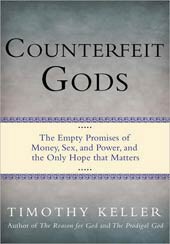Counterfeit Gods: American Idols
 Tim Keller, pastor of Redeemer Presbyterian Church in New York City, has written a new book entitled "Counterfeit Gods: The Empty Promises of Money, Sex, and Power, and the Only Hope That Matters".
Tim Keller, pastor of Redeemer Presbyterian Church in New York City, has written a new book entitled "Counterfeit Gods: The Empty Promises of Money, Sex, and Power, and the Only Hope That Matters".There is a good interview with Tim concerning the book here. Some excerpts of the interview.
Do Christians have blind spots when it comes to false gods?Here is a brief video introduction to the book by Keller himself.An idol is something you rely on instead of God for your salvation. One of the religious idols is your moral record: "God accepts me because I'm living a good life." I'm a Presbyterian, so I'm all for right doctrine. But you can start to feel very superior to everyone else and think, God is pleased with me because I'm so true to the right doctrine. The right doctrine and one's moral record are forms of power. Another is ministry success, similar to the idol of achievement. There are religious versions of sex, money, and power, and they are pretty subtle.
How does someone identify their idols?
Look at your daydreams. When you don't have to think about something, like when you are waiting for the bus, where does your mind love to rest? Or, look at where you spend your money most effortlessly. Also, if you take your most uncontrolled emotions or the guilt that you can't get rid of, you'll find your idols at the bottom. Whenever I hear someone say, "I know God forgives me, but I can't forgive myself," it means that person has something that is more important than God, because God forgives them. If you look at your greatest nightmare—if something were to happen that would make you feel you had no reason to live—that's a god.
How do we get rid of idols?
I confess that I don't say much about that. Practicing spiritual disciplines is another book. I do say that analyzing and recognizing an idol is a step away from its power over you. You also have to have a heck of a prayer life. That prayer life can't just be petitioning. There has to be encounter, experience, and genuine joy. You have to have Jesus Christ increasingly capture your affections.
Is it necessary to suffer disappointment before seeing that idols don't satisfy?
I fear you may be right. I don't want that to be true. Very often it's much stronger than disappointment. It's hard for me to look at a young person and know what their idols are, because usually something has to happen in their life to frustrate them for them to see that something has inordinate power over them. No one learned about their idols by being told about them.
Read the whole interview, and then buy and read the book. Keller is one of our best American writers right now, and is very thoughtful and compelling. I am a fan. [SDG - JS]





